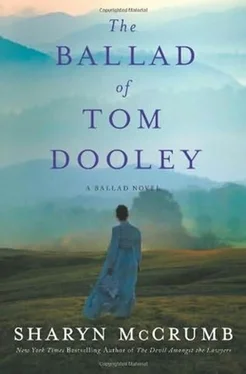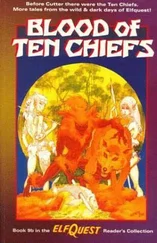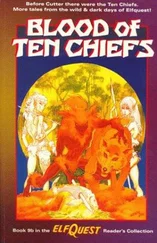Captain Allison is an able fellow, and I’m sure he could have handled this case without having an out-of-work ex-governor underfoot, but he was gracious in receiving me, and kind enough to brief me in the facts of the case, before I went off to interview the client, to determine the situation for myself.
The prisoner has spent some three months in the Wilkes County jail, a solid two-story red brick building, sparse of windows, as befits a place that detains murderers. It sits behind the white-columned brick courthouse, like a ruddy calf in the lee of its stalwart mother, but it is a pleasant prospect for a prison, with shade trees softening the aspect of the structures, and a distant line of hills framing the valley now in autumn tints of gold and scarlet.
I was raised in just such a village, in the towering blue mountains that lie between Asheville and the border of Tennessee, and I missed those sheltering hills in my life these days, for I had left their peaceful majesty when I was barely twenty, for the opportunities afforded me by the more prosperous flatlands. First I went to study law at the university in Chapel Hill, and, after a stint in the court system back home in Buncombe County, I set out for Washington to serve in Congress. Though I argued mightily against secession, I was forced to leave the U.S. government when North Carolina did, and, unable to prevent the War, I took my place among the fighting as colonel of the 26th North Carolina, a homegrown regiment. I had no particular military prowess, you understand. In those days, when the continent was trying to mount two armies from the remnants of one, anybody who could get five hundred men to sign up and serve under him was automatically made a colonel, for it was assumed that such a man could afford to buy his own horse and sword.
But the best fighting is politicking. I left the conflict in midstream to take up residence in the Governor’s Mansion in Raleigh, and from there, when the Confederacy fell, I found myself back in Washington, this time in a Union prison, along with the rest of the Confederate governors, as the victors seemed intent on collecting the whole set.
A year ago last July, they set me free again, and I took the train back to North Carolina, forbidden to hold political office yet awhile, for, in remaining loyal to my home state, I had rendered myself a traitor to the greater Union. Thus barred from politicking, I was forced to fall back on my original profession-the practice of law, although I had done none of it in a decade, and I doubted that I had either the experience or the inclination to make much headway with it. Still, a man must live, and it was tolerably honest work-well, as much so as being a Congressman is, I reckon.
The Wilkes County jail, that squat brick building set behind the courthouse, is rather dark inside, and, after the corridors of the Governor’s Mansion, it might have struck me as a bit low and cramped, but for my recent stay in similar accommodations in what was again our nation’s capital.
“We have much in common,” I told the prisoner.
He sat before me, gaunt, shaggy-haired, and scowling, rubbing at the iron shackles on his wrists, for they had chafed his skin. He gave me an appraising stare with those cold blue eyes, and I wondered if I was looking into the soul of a killer, but I had taken him on as a client, and so, unless he admitted it himself, I must believe him innocent. I wonder, though. When the War came, we took beardless boys out of the cabins, and sent them into the depths of hell, in places like Antietam and the Wilderness, and some of them came back changed. Once a dog has killed a chicken, you might as well shoot him, for you can never trust him again.
I was against the War from the beginning, and only incidentally because North Carolina’s secession would cost me my seat in Congress. When the Tarheels left the Union, I was on the stump, in my hometown of Mars Hill, orating mightily in favor of staying out of the Confederacy. I had just raised my hand to heaven to emphasize my point when a little towheaded boy came running out of the telegraph office, calling out that Fort Sumter in South Carolina had been fired upon, and that President Lincoln was calling for seventy-five thousand volunteers to put down the insurrection: that is, to invade our sister state, which North Carolinians would never do. Slowly, I let my hand fall.
So those who were hell-bent on the War had got it, and as if we had not suffered destruction enough in the four years it lasted, I thought we might now be getting another kind of retribution. In a generation of young men, we sowed the seeds of violence, and violence we shall reap.
***
“I thank you for coming to see me,” said the prisoner, “but you know I warn’t in your regiment, Governor.”
“I’m relieved to hear it.”
He reddened a little, and nodded, thinking I meant that I would be ashamed to claim him as a comrade because of his current difficulty.
“It isn’t that,” I assured him. “I have heard that you were taken prisoner near Kinston at the end of the War, but I was long gone from there by then, so your troubles in ’65 cannot be charged to my scroll.”
“No. You was the Governor by then.”
“And I went to jail as well, you know. About the time the Union let you go, they started rounding up all the Southern governors, and so I did three months in a Washington prison, in the congenial company of Governor Letcher of Virginia.” I looked around at the bare room with its whitewashed walls and the rough-hewn pine table that separated me from the prisoner. “How does this prison measure up to your Yankee prison camp? It certainly puts me in mind of the one I was in up in Washington.”
He shrugged. “It is tolerable, sir. At least here I sleep inside out of the weather, and they do feed me. I miss the taste of whiskey, but that’s about all, I ain’t used to much in the way of finery, nohow. My mother is a widow woman, and our ridge land don’t amount to much. I reckon you know there’s no money to pay a lawyer.”
“I didn’t suppose that there was.”
“Yet you come all the way up here from Charlotte, anyhow?”
I smiled, hearing in his question another point of similarity between him and me. Mountain people do not like to feel themselves in anyone’s debt. Apparently, judging from my client’s troubled eyes, not even if his life depended on it. He had been at pains to make it clear to me that he had not served under me in the War, thus relieving me of a sense of obligation, and now he underscored the point that he could not pay my fee, so if I proceeded to act on his behalf, it was my own decision, and not for duty or for gain. I confess I liked him the better for his forthrightness.
In my younger days, when anybody did me a good turn, I would lie awake nights trying to figure a way to repay his kindness. Later, though, after I had married a member of the Burke County gentry, and became accustomed to the customs of civilization, I learned that obligations are the currency of polite society. You want people to be forever indebted to you for some favor or other, in case you should ever need their power or their influence to advance yourself. This system of influence peddling took some getting used to, but I got the hang of it soon enough. I had been studying rich people most of my life, and if I never got exactly to feeling like one, I reckon I could pass muster amongst them, but the proud independence of my fellow mountaineers still warmed my heart.
“You mustn’t feel beholden to me,” I assured the shaggy young man. “The money is not an issue. I am obliged for the chance to defend you. The government won’t let me run for political office yet, you know, so I must fall back on lawyering to earn my living, but, between the War and my time in Congress, I am years out of practice. So you are my test case, and I hope that you will also prove to be an advertisement of my skill as a defense attorney.”
Читать дальше












